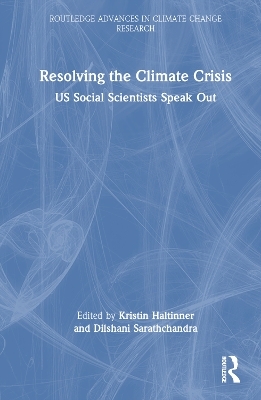
Resolving the Climate Crisis
Routledge (Verlag)
978-1-032-56657-3 (ISBN)
- Lieferbar (Termin unbekannt)
- Versandkostenfrei innerhalb Deutschlands
- Auch auf Rechnung
- Verfügbarkeit in der Filiale vor Ort prüfen
- Artikel merken
Despite efforts for mitigation, global emission levels continue to increase annually and the world’s wealthiest nations, including all of the G20 countries, have failed to meet their Paris Climate Goals. In the absence of political will, many have called for individuals to act on climate change by mitigating their own carbon footprint through having fewer children, driving less, using LED lightbulbs, or by becoming vegetarians. While compelling, individual lifestyle changes on this scale are unlikely to prevent climate disaster. Resolving the Climate Crisis presents informed solutions for social change that center human behavior and emotions, political systems, and societal structures. Across a series of concise and accessible chapters, authors explore potential solutions to climate change, addressing topics including Indigenous ecologies, LGBTQ+ community engagement, renewable energy technologies, and climate justice. Their expert engagement with the social and behavioural sciences makes this book not only an essential handbook of climate change solutions but also an innovative model for public-facing social science scholarship.
Resolving the Climate Crisis will be an essential resource for students and researchers of climate change, as well as policy makers working to develop meaningful strategies for combatting the climate crisis.
Kristin Haltinner is a Professor of Sociology at the University of Idaho. Dilshani Sarathchandra is an Associate Professor of Sociology at the University of Idaho.
Introduction
Engaging Social Science Knowledge to Resolve the Climate Crisis
Kristin Haltinner and Dilshani Sarathchandra
Part 1: Rejecting Our Toxic Cultural Stories
Chapter 1: A Community-University Collaboration for Climate Justice
David N. Pellow
Chapter 2: Towards Earthbound Climate Movements: The Importance of Understanding Ontology and Settler Colonialism in Engaging the Climate Crisis
David Osborn
Chapter 3: Gender and Climate Justice
Christina Ergas
Part 2: Recognizing Existing Use of Alternative Stories
Chapter 4: Doing One’s Part of the Job: The Norwegian Dugnad Tradition in a Global Climate Perspective
Anne Kristine Haugestad and Kari Marie Norgaard
Chapter 5: In/Action in Addressing the Climate Crisis: The Possibilities of Generation Z
Hannah Block, Cailin Lorek, and Ryan Alaniz
Chapter 6: Queer Political Culture in the Face of the Climate Crisis
Melanie M. Bowers and Cameron T. Whitley
Part 3: Changing the Stories
Chapter 7: Overcoming Hurdles to Climate Mitigation: How Motivational Barriers Impact Strategies for Change
Samantha Noll
Chapter 8: We are the Collective
Kristin Haltinner
Chapter 9: Insights from Social and Behavioral Sciences to Motivate Climate Action
Dilshani Sarathchandra
Chapter 10: ACT Now: Words, Actions, and Values in Tackling the Human Dimensions of the Climate Crisis
Jack DeWaard
Part 4: Amplifying Stories on the Margins
Chapter 11: Dismantling the Settler Paradigm in Indigenous Climate Resilience
Aiyana James and Laura Laumatia
Chapter 12: Criminalizing Climate Change: Defining and Responding to Ecocide
Taylor June, Hollie Nyseth Nzitatira, and Nicole Fox
Chapter 13: Framing the Climate Crisis: A Sociological Lens through Documentary Film
Cedric A. L. Taylor
Part 5: Organizing Through a New Ethic
Chapter 14: From Vulnerability to Co-Production: Centering Indigenous Ecologies in Arctic Climate Adaptation
P. Joshua Griffin
Chapter 15: Closing the Social Gap in the Deployment of Renewable Energy Technologies
David Bidwell and Shannon Howley
Chapter 16: Futures Born of the Past and Present: Building Transitions as Collaborative Projects of Justice
Tristan Partridge and Javiera Barandiarán
Chapter 17: Listening and Building Trust: Community-Led Conservation in Lincoln, Montana
Ryanne Pilgeram and Jordan Reeves
Chapter 18: Cattle Grazing and Climate Change Adaptation: Local Environmental Knowledge and Public Lands Management in the US West
Chloe B. Wardropper and Nicolas T. Bergmann
Conclusion
How to Mobilize Public Will to Resolve the Climate Crisis
Kristin Haltinner and Dilshani Sarathchandra
Index
| Erscheinungsdatum | 13.06.2024 |
|---|---|
| Reihe/Serie | Routledge Advances in Climate Change Research |
| Zusatzinfo | 1 Line drawings, black and white; 1 Illustrations, black and white |
| Verlagsort | London |
| Sprache | englisch |
| Maße | 156 x 234 mm |
| Themenwelt | Naturwissenschaften ► Biologie ► Ökologie / Naturschutz |
| Technik ► Elektrotechnik / Energietechnik | |
| Technik ► Umwelttechnik / Biotechnologie | |
| ISBN-10 | 1-032-56657-4 / 1032566574 |
| ISBN-13 | 978-1-032-56657-3 / 9781032566573 |
| Zustand | Neuware |
| Haben Sie eine Frage zum Produkt? |
aus dem Bereich


